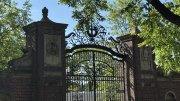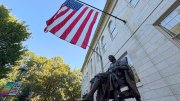Harvard has asked a federal judge to rule in its favor in its lawsuit seeking to overturn the Trump administration’s freeze and termination of billions of dollars in federal research funding. In a 62-page court filing submitted Monday to the U.S. District Court of Massachusetts, the University requested summary judgment—or a decision made without a full trial—and asked the court to act before September 3, the deadline it was given by the federal government to start submitting paperwork that would formally close out grant funding.
Harvard argued that after that deadline, the federal government is likely to claim it cannot reinstate the frozen funds. The University said relief is essential before then to avoid permanent harm to ongoing research and academic operations.
In April, Judge Allison Burroughs, of the Massachusetts district court, granted Harvard’s request for an expedited trial, scheduling oral arguments for July 21.
In its motion, the University argued that the government has presented it with an “unconstitutional ultimatum”: let the federal government control its speech, teaching, admissions, hiring, and governance—or lose all federal funding.
According to Harvard, internal emails and agency memos reveal that Trump administration officials ordered across-the-board terminations, overruling objections from staff in federal agencies such as the Department of Defense, after Harvard filed its lawsuit.
Harvard also claims that federal agencies were instructed to use boilerplate termination letters and meet arbitrary deadlines. The White House, the University alleges, directed the process without regard to individual grants, scientific merit, or legal standards—a “shoot first, aim never” approach that undermines established norms of administrative decision-making.
The University says the freeze affects a wide range of research programs, including work on cancer treatments, radiation protection for astronauts, ALS, and suicide prevention for veterans. It argues that these projects have no connection to antisemitism and that their termination was driven solely by a desire to punish Harvard for refusing to comply with political demands.
Harvard points to its own efforts to address antisemitism on campus, including new disciplinary policies, enhanced safety measures, and clarified protest guidelines. These changes, the University says, demonstrate that it has taken antisemitism seriously and contradicts the claim that it has been “deliberately indifferent,” as former student Shabbos Kestenbaum, M.T.S. ’24, has alleged.
The lawsuit also argues that the government’s actions have already caused significant disruption to Harvard’s research. The University emphasized that research projects cannot be paused indefinitely: equipment degrades, students look for other positions, and faculty eventually abandon their projects.
Harvard cites public comments from officials, including President Donald Trump, as evidence that the funding freeze was retaliatory. The filing quotes Trump saying that “every time [Harvard] fight[s], they lose another $250 million” and notes a White House spokesperson’s remark that the University “would have saved [itself] from [its] self-inflicted demise” if it had not filed the lawsuit.
Late last month, the University also sued the Trump administration over its attempt to bar Harvard from enrolling international students. Burroughs temporarily blocked that policy while the case proceeds.









